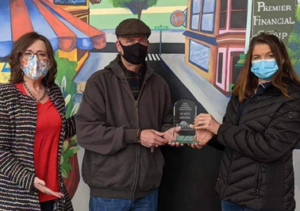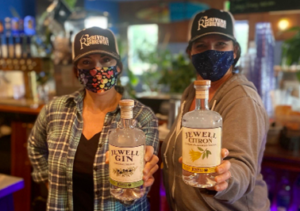
Crisis & Transformation in Food Retail
How altruism and solidarity are helping our community cope with economic crisis and lay a foundation for long-term resilience.
by Leila Roberts, North Coast Small Business Development Center
You and I are living through a brief moment in human history that our species may not survive intact. Add to this pandemic global climate disruption and a crisis of economic inequality and political upheaval and the future seems bleak.
Our human gifts of mass social cooperation and tool-using genius created the political economies that brought us to this point, but they won’t help us transcend them unless we leverage another survival strategy: altruism.
What can we learn from the ingenuity and generosity of local food businesses about how to anticipate, survive, and transcend our multiple crises?
Food Industry in Crisis
A mid 2020 McKinsey study projected that if our national response to the pandemic is effective we may start to see economic recovery in the food value chain in early 2021. But if our safety practices and vaccine roll-out aren’t enough to prevent another infection surge, the recovery could drag on for 3-4 years, and we’ll lose many precious local businesses along the way.
Governments are trying to put the people’s will to work with imperfect – but still desperately needed – financial assistance. At the time of writing we’re expecting up to $25 billion in new federal grants for restaurants and bars hard-hit by the pandemic, a tripling of the state relief grant program, liquor license fee waivers, and more local loan and grant programs.
These are all policy choices with an important positive impact on our local food business owners’ and workers’ day-to-day lives. But crisis response does not prepare us for the next emergency unless we’re strategic about it.
Adaptive Altruism: From Relief to Regeneration
In mid 2020 dozens of frontline economic, racial, and climate justice groups launched United Frontline Table. They agreed to work together toward 80+ policy solutions organized in fourteen planks for a Regenerative Economy and Green New Deal for shifting us toward regenerative economies (see overview at right).
Within this framework are food sovereignty proposals that put “the aspirations and needs of those who produce, distribute and consume food at the heart of food systems and policies rather than the demands of markets and corporations.”
A PEOPLE’S ORIENTATION TO A REGENERATIVE ECONOMYExcerpted with permission from unitedfrontlinetable.org/report/ Protect, Repair, Invest & Transform The intersecting crises of income and wealth inequality and climate change, driven by systemic white supremacy and gender inequality, has exposed the frailty of the U.S. economy and democracy. The COVID-19 pandemic has exacerbated these existing crises and underlying conditions. Democratic processes have been undermined at the expense of people’s jobs, health, safety, and dignity. We need a shift in popular consciousness. A People’s Orientation to a Regenerative Economy offers community groups, policy advocates, and policymakers a pathway to solutions that work for frontline communities and workers. These policies must be enacted at the federal level, and also at the local, state, tribal, and regional levels, in U.S. Territories, and internationally. These fourteen planks entail over 80 policy ideas. They are deeply intertwined and should be held as a collective framework to achieve a Regenerative Economy. The planks are organized starting with a focus on championing human rights and dignity, moving into infrastructure shifts for a Regenerative Economy, and ending with how we can resource these solutions.
Regenerative Economy is based on ecological restoration, community protection, equitable partnerships, justice, and full and fair participatory processes. Learn more and read the full report at unitedfrontlinetable.org/report/ |
Solidarity Entrepreneurship
Today on the North Coast our current reality sits somewhere between the beautiful vision articulated by United Frontline Table and the current crises. Some local food businesses are finding ways to adapt to the pandemic without losing their commitment to this community. They embody many of the principles outlined by United Frontline Table.

US Vets Deliver’s Jim Richards accepts the Eureka Chamber of Commerce 2020 Positive Community Impact Award
Delivery without exploitation: US Vets Deliver
App-based food delivery companies are leveraging more than 1.5 billion in venture capital to grow a business model that extracts wealth from communities for faraway shareholders. Their massive financial backing allows them to operate at a loss so they can blanket communities with advertising to grab market share, often underpay delivery workers, and charge fees that take a damaging cut of local restaurants’ narrow margins.
Jim Richards of Ferndale started delivering for Door Dash out of necessity. He quickly saw an opportunity to meet an unserved market when he realized how many local restaurants wisely refused to sign on to the delivery service apps with ruinous fees. He saw how badly compensated the hard-working delivery workers were. He noticed how many customers had disposable income going unspent because it was unsafe to dine-in and inconvenient to pick up.
So, mid-pandemic Jim launched US Vets Deliver – a business that competes effectively with the app-based firms sucking dollars out of local communities.
“My goal is to make a living and help local restaurants stay connected to customers. We hire drivers who can give our customers the attention to detail and customer service they want. Sometimes I sit and chat for fifteen minutes with some of our older customers. It’s a great way to build that relationship,” Jim says.
“We serve people who like good food and don’t mind tipping. The model I created is a win-win-win. We don’t charge restaurants. We set our rates so that our drivers can’t work themselves into a sub-minimum wage outcome. The delivery fee and tip go straight to the driver.”
You can find US Vets Deliver on Facebook, or reach them by text at 707-298-9595.

Meredith Maier and Talia Nachson Clare, Six Rivers Brewery
A Rising Tide Lifts All Boats: Six Rivers Brewery
In 2019 a national restaurant industry group announced that revenue from delivery sales was growing three times faster than on-site dining. With the arrival of a worldwide pandemic, any restaurant that doesn’t offer food delivery and pick-up won’t last long.
Mckinleyville’s Six Rivers Brewery – “The Brew with a View” – is a small batch craft brewery and restaurant that draws loyal customers who packed the space every evening and weekend for 16+ years. Six Rivers’ co-owners Meredith Maier and Talia Nachson Clare are a case study in excellent “Pandemic Pivoting.”
They engineered a lightning-fast shift to meal pick-up and outdoor dining and became locally famous for their funny, spicy social media posts showing them enforcing strict pandemic safety practices. Their shift to counter service and commitment to protecting customers and employees worked. “Like everyone else we took a loss for the year overall, but still managed to turn a profit during the summer high season,” Meredith explained.
Their most telling pandemic strategy was sharing the wealth with fellow business owners. Customers of Six Rivers Brewery can at the same time patronize two local food trucks invited to sell in the outdoor space and buy more than 50 local products on sale from the brewpub’s community marketplace: local beers and wines, liquors and kombucha, spices, hot sauces and dressings, chocolates, body care products, fresh fish, local honey, and various clothing and home merchandise.
“We used to sell a few hundred dollars in merchandise a month. This past summer it was up to $1,000 a day. I wave that Shop Local flag like crazy. Every six pack I sell helps our business and our staff. So I know that every jar of Diane’s Sweet Heat or Humboldt Hot Sauce does the same for them,” Meredith shared.
“What do we want to be remembered for? We think of our business as an extension of the community…In a small community we truly can keep each afloat and make a difference with small purchases.”
A Resilient Ownership Model
In 2018 a Humboldt business survey uncovered that 62% of seasoned owners were considering selling their business to their employees. We’re also seeing dozens of potential entrepreneurs percolating new business start-up ideas. Straddling both trends on the North Coast is a growing number of businesses that will be owned by the workers themselves.
This is good for workers’ asset- and skill-building, good for the tax base, and good for closing the racial wealth gap. Worker-ownership creates more resilience in an economic crisis. A 2017 study of ESOP (Employee Stock Ownership Program) companies showed that employees built nearly twice as much net worth as other companies, stayed longer, and earned more. A 2020 follow up reaffirmed previous findings and then some. Employees with a stake in their company’s future retained four times more jobs in the pandemic crisis, were half as likely to cut hours and pay, and were more likely to quickly implement pandemic protective measures.
Right now, the North Coast Small Business Development Center, Cooperation Humboldt, and Project Equity are collaborating to support at least 10 new and a handful of converted worker-owned businesses in Humboldt. These range from solo enterprises to 50+ employees, across a variety of industries: food manufacturing and service, durable goods retail, energy, engineering, and more.
Re-thinking Ownership: Signature Coffee Company
Signature Coffee Company, based in Southern Humboldt, has been a pioneer in fair trade, organic coffee sourcing and roasting since the 1980s. They have long followed waste reduction and sustainability best practices. Now they’re breaking new ground again for the next phase of the business: an eventual conversion to worker ownership.
Signature’s founder and owner Karyn Lee-Thomas is determined to follow this exit strategy, saying “This really is the best way to mitigate corporate greed and create a new paradigm of corporate consciousness. It is a way for us to work together to create a stronger, healthier community, county, state and country.”
Here on the North Coast, creative solutions to the numerous interrelated crises we face abound. We’re proud to share these local examples of businesses responding with solutions based in altruism, solidarity, and regeneration, and we invite you to join us in supporting them.
. . . . . . . . . . . . . . . . . . . . . . . . . . . . . . . . . . .
Leila Roberts serves as Director of the North Coast Small Business Development Center (SBDC), which helps small, local businesses start, grow, and thrive in Humboldt, Del Norte, and Adjacent Tribal Lands. She constantly asks, “Who has access and opportunity? Who benefits?”
. . . . . . . . . . . . . . . . . . . . . . . . . . . . . . . . . . .
|
What’s a worker-owned cooperative? Worker owned cooperatives (co-ops) are entities that buy and sell goods and services, just like traditional businesses, but they are owned by their workers, rather than by shareholders. Worker cooperatives empower workers to make decisions that impact their lives and livelihoods, learn new skills, and share equitably in a business’s profits. They put the needs of people and the environment first (as compared with most current capitalist business structures, which prioritize financial returns to investors above all else). Cooperatives are based on the values of self-help, self-responsibility, democracy, equality, equity and solidarity. In the tradition of their founders, co-operative members believe in the ethical values of honesty, openness, social responsibility and caring for others. Worker Owned Humboldt (WOH) is a project of Cooperation Humboldt. In partnership with the North Coast SBDC and Project Equity, WOH is incubating new worker-owned businesses in Humboldt County. Learn more: cooperationhumboldt.com/worker-owned-humboldt/ |